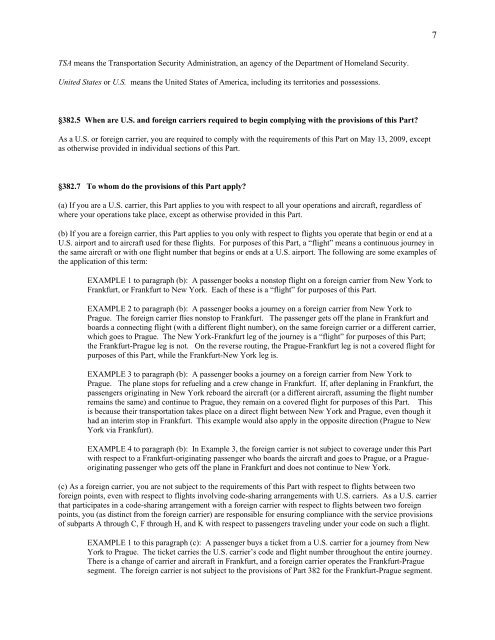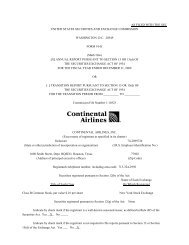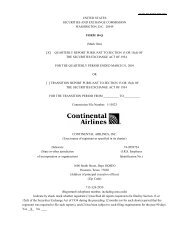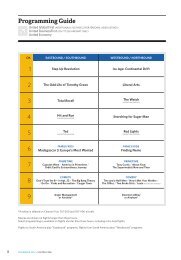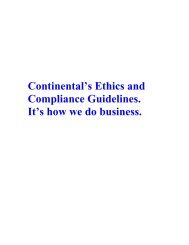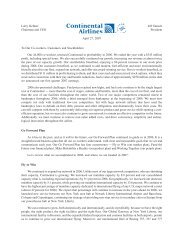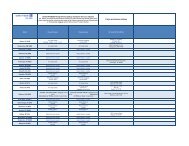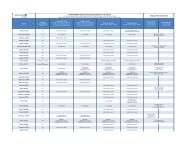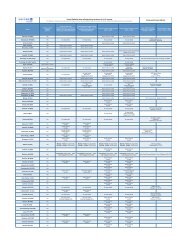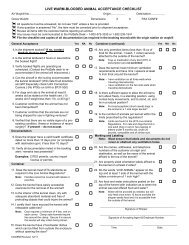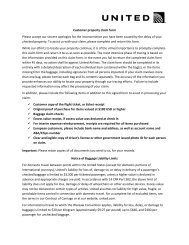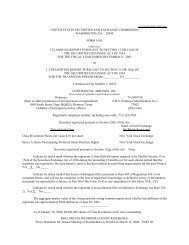ACAA Final Rule.pdf - United Airlines
ACAA Final Rule.pdf - United Airlines
ACAA Final Rule.pdf - United Airlines
Create successful ePaper yourself
Turn your PDF publications into a flip-book with our unique Google optimized e-Paper software.
7<br />
TSA means the Transportation Security Administration, an agency of the Department of Homeland Security.<br />
<strong>United</strong> States or U.S. means the <strong>United</strong> States of America, including its territories and possessions.<br />
§382.5 When are U.S. and foreign carriers required to begin complying with the provisions of this Part?<br />
As a U.S. or foreign carrier, you are required to comply with the requirements of this Part on May 13, 2009, except<br />
as otherwise provided in individual sections of this Part.<br />
§382.7 To whom do the provisions of this Part apply?<br />
(a) If you are a U.S. carrier, this Part applies to you with respect to all your operations and aircraft, regardless of<br />
where your operations take place, except as otherwise provided in this Part.<br />
(b) If you are a foreign carrier, this Part applies to you only with respect to flights you operate that begin or end at a<br />
U.S. airport and to aircraft used for these flights. For purposes of this Part, a “flight” means a continuous journey in<br />
the same aircraft or with one flight number that begins or ends at a U.S. airport. The following are some examples of<br />
the application of this term:<br />
EXAMPLE 1 to paragraph (b): A passenger books a nonstop flight on a foreign carrier from New York to<br />
Frankfurt, or Frankfurt to New York. Each of these is a “flight” for purposes of this Part.<br />
EXAMPLE 2 to paragraph (b): A passenger books a journey on a foreign carrier from New York to<br />
Prague. The foreign carrier flies nonstop to Frankfurt. The passenger gets off the plane in Frankfurt and<br />
boards a connecting flight (with a different flight number), on the same foreign carrier or a different carrier,<br />
which goes to Prague. The New York-Frankfurt leg of the journey is a “flight” for purposes of this Part;<br />
the Frankfurt-Prague leg is not. On the reverse routing, the Prague-Frankfurt leg is not a covered flight for<br />
purposes of this Part, while the Frankfurt-New York leg is.<br />
EXAMPLE 3 to paragraph (b): A passenger books a journey on a foreign carrier from New York to<br />
Prague. The plane stops for refueling and a crew change in Frankfurt. If, after deplaning in Frankfurt, the<br />
passengers originating in New York reboard the aircraft (or a different aircraft, assuming the flight number<br />
remains the same) and continue to Prague, they remain on a covered flight for purposes of this Part. This<br />
is because their transportation takes place on a direct flight between New York and Prague, even though it<br />
had an interim stop in Frankfurt. This example would also apply in the opposite direction (Prague to New<br />
York via Frankfurt).<br />
EXAMPLE 4 to paragraph (b): In Example 3, the foreign carrier is not subject to coverage under this Part<br />
with respect to a Frankfurt-originating passenger who boards the aircraft and goes to Prague, or a Pragueoriginating<br />
passenger who gets off the plane in Frankfurt and does not continue to New York.<br />
(c) As a foreign carrier, you are not subject to the requirements of this Part with respect to flights between two<br />
foreign points, even with respect to flights involving code-sharing arrangements with U.S. carriers. As a U.S. carrier<br />
that participates in a code-sharing arrangement with a foreign carrier with respect to flights between two foreign<br />
points, you (as distinct from the foreign carrier) are responsible for ensuring compliance with the service provisions<br />
of subparts A through C, F through H, and K with respect to passengers traveling under your code on such a flight.<br />
EXAMPLE 1 to this paragraph (c): A passenger buys a ticket from a U.S. carrier for a journey from New<br />
York to Prague. The ticket carries the U.S. carrier’s code and flight number throughout the entire journey.<br />
There is a change of carrier and aircraft in Frankfurt, and a foreign carrier operates the Frankfurt-Prague<br />
segment. The foreign carrier is not subject to the provisions of Part 382 for the Frankfurt-Prague segment.


